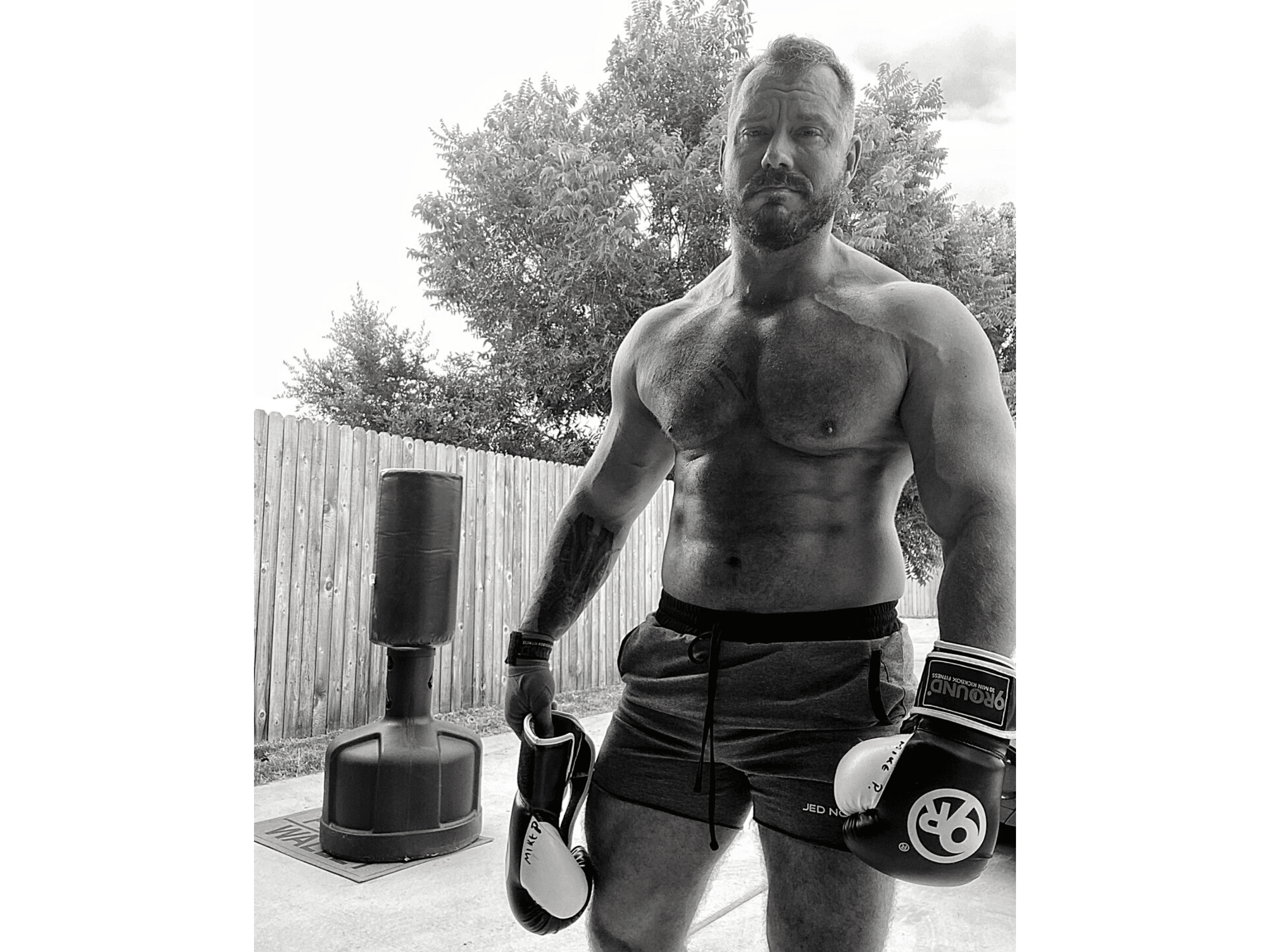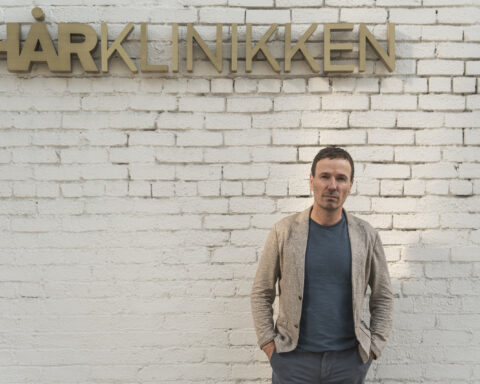It’s fair to say Mike Parent is not your typical psychologist.
He’s an award-winning professor at The University of Austin, Texas, with a PhD in counseling psychology and is a fellow of the American Psychological Association. He’s also authored more than 100 research papers and runs his own innovative telepsychology practice.
Mike also happens to be a 6ft 3in, 250lb competitive bodybuilder with huge, erm, Instagram following. And his passions for building his mind and muscle are more complimentary than we might think.
We talk about these vital topics at all times of the year, but with World Mental Health Day on Saturday, we particularly want to shine a light on men’s mental health this week.
Around a third of men have suffered with period of depression at some point in their lives. And nearly one in ten men suffer from depression on a daily basis. Yet three quarters of these men do not get help from a medical professional, with less than half as many men seeking treatment compared to women. Yet the suicide rate among men is around 3.5 times higher than females.
A common issue among men is the stigma surrounding talking about mental health issues, and preconceived notions that seeking treatment makes you weak.
Try telling that to Mike.

Mike Parent // 📸: Mike Parent/FuriousFotog
Words by Mike Parent, PhD
I hear it a lot, “You don’t look like a professor.”
But I just feel like I have a strong sense of personal growth. I finished off my PhD a while ago and I’m doing an MBA now. So my education hasn’t stopped. And I grew up watching Arnold Schwarzenegger and Jean-Claude Van Damme and am now a competitive bodybuilder.
I find exercise a chance to not be in my head so much, as I have a very cerebral job. So in many ways it’s complimentary, although maybe not parallel. And I think that’s good.
I’ve said to people who’ve come in for counseling, “I bet you’re expecting a woman or an old man.” I think it’s really important that as therapists we have to be ourselves.
Especially when I have male clients, and we start getting into more intense parts of therapy and they start opening up and crying or things like that, I ask them how it felt to cry in front of me. And invariably, people say, “It felt good.”
There are two ways of thinking about mental health. One is the classic or traditional way, which is what we in psychology called deficit based approach, which is looking at people facing issues like depression, or anxiety or eating disorder. And then trying to help them overcome those problems.
Then the second way is a more asset based approach, which is helping people not only to overcome some of the challenges they are facing, but proactively be more healthy in their everyday life. So it’s not just for people who are having major depressive disorder or anxiety, but also for people who want to learn to live their life more completely, and really be more themselves.

Mike’s latest Instagram gym selfie // 📸: Mike Parent / Instagram
THE PRESSURES ON MEN
One of the one of the big misfortunes in mental health treatment is that a lot of the models are based on experiences of women who are traditionally less reluctant to seek help. So men’s mental health issues have been ignored to a really large degree.
Most of us see depression and anxiety as the bread and butter of our practices. But even that can have really important gender differences, like many men are socialized and have an easier time expressing anger, rather than sadness. So many men who are punching holes in walls and that sort of a thing are actually dealing not with what we call explosive anger disorders, but maybe with depression, anxiety or stress. It’s just easier to express that as externalized aggression, rather than tearfulness. And a lot of therapists get afraid of men who are angry.
There are some basic biological differences between men and women, but it’s largely socialization. There are men who were told at their dad’s funeral, “Now you’re the man of the house and big boys don’t cry.” So really harsh socialization messages. It’s great to be able to change your own tyre if you get a flat. But if you become incapable of asking anybody for help when you’re unable to do something, and view it as an insult to your masculinity, that becomes really maladaptive.
I think there’s probably a massive under diagnosis of men experiencing depression, both because they aren’t going to therapy as much, and then when they do, they might have some stereotypes put on them by the therapist that results in misdiagnosis. So I think it works from both ends to disadvantage men.
If you get your idea of what therapy is from TV, it’s a lot of emotional gushing and crying and complaining about mother, things like that, which isn’t really what any well-trained therapists would be doing in the room. So that’s one stigma. And the other is just the stigma of interpreting going to counseling as meaning, “I can’t handle my life.” If you’re the kind of man who is hesitant to ask for directions to a store, you’re probably going to have a lot of time or a hard time saying, “What’s going on in my life exceeds my resources.”
And I think people with minority identities might experience different sets of stressors. So for example, gay or bisexual men experiencing the stress of whether or not they come out in their workplace, or whether or not they bring their partner to work functions.
I’m a competitive bodybuilder. And I think I think it’s important that we do not pathologize exercise, and I think people have sometimes gone too far the other way, viewing bodybuilding or fitness activities as indicative of body image disorders, when I don’t think that’s necessarily the case.
What we do find though, is that for some people if work comes up and they can’t go to the gym, they have veritable panic attack of losing their gains because they didn’t exercise one day. And I think there are times like that when it can intersect with anxiety or depression, or unhealthy eating habits that it can become really negative and unhealthy. So the person is exercising, but not out of a personal striving to be to be healthier physically.

Mike at 17 and in a recent bodybuilding competition // 📸: Mike Parent / James Allen
MAIN TYPES OF MENTAL ILLNESS
Depression and anxiety are the most prevalent conditions. A lot of people think of depression as being sad and tearful all the time, which it can certainly be. But it can also be expressed in different kinds of ways. So anger or being really irritable or frustrated all the time can be used as signposts that something in your life is unbalanced, because there’s something that’s not a fit with who you are, or who you want to be. So it’s important to be able to recognize those as being a sign of an imbalance that a therapist can help you to locate and then address.
And anxiety is an excessive amount of worry or concern, either about the past, the present, or the future, that becomes impairing for us. So this might show up in spending all the time worrying about work or not being able to sleep. It can also show up physiologically, so a lot of people feel this physical tension build throughout the day, their muscles start getting tense, they might start having headaches or stomach problems.
Other conditions include things like eating disorders, that are massively undiagnosed in men. Even some of the assessments that we use about eating disorders are are basically entirely developed for women. And some of them can’t even be really be answered by men because of how the questions are worded. So there’s a pretty strong bias toward diagnosing it in women.
Some men do experience the typical anorexia, feeling fat and wanting to reduce and restrict. But we do know that bulimia and binge eating disorders are more common among men than anorexia and the sex ratio. The stereotype of bulimia is a woman who eats and that makes herself sick. But men might engage in other compensatory behaviors, like not eating after binge eating, or doing exercise or way too much time in the sauna. And we see this a lot in athletes, and athletes who died, taking diuretics, not drinking water, and then exercising for three hours then going into the sauna.
Traumatic stress is another big one, and that is not just limited to people who’ve had combat experience. Post traumatic stress is essentially associated to a triggering event, any experience or something you witness that is potentially extremely dangerous or deadly for you. So it could be things like witnessing or being in a car accident. And one thing that’s massively overlooked in men is childhood sexual trauma, especially if it was a female perpetrator, like a babysitter or something like that. People reacting with, “Why is he complaining?”
And the rates of substance abuse are much higher among men than women. It seems to be a maladaptive coping mechanism for things like depression or anxiety. And of course, much of it is biological. So people do inherit dispositions toward substance abuse and addiction. And then other forms of addiction to like gambling, which can be what we call a process addiction. Those are serious conditions that can lead to major disruptions in life and family and legal problems. And it’s really important to seek help, and unfortunately many people don’t until they get in trouble.

Mike at work // 📸: Mike Parent / Instagram
HOW WE CAN IMPROVE
I think it’s important to recognize how counseling or therapy can be useful, not just from the deficit approach, but also from skill building and personal enhancement. So approach it in a way that helps us to meet our goals and be better in our own lives, be better partners, feel less stress and be happier in general in everyday life. So I think having that openness and being able to engage with these services is good. It would be great if society didn’t have these negative socialization messages for men and women that end up limiting us, and we didn’t sort of enforce these rigid gender roles and punish people for deviating from them. People have different ways of living our own fulfilling lives.
Initiatives like World Mental Heath Day are vitally important. There’s a lot of stigma worldwide and within individual cultural groups against mental health diagnoses and treatments. And then in combination with that, there are a lot of issues both domestically and internationally, with people not really paying attention to how individuals can be marginalized.
Everybody gets pressures to put in more than 100% effort across parts of your life. You have to be all these different things to all these different people. And I think that looks different for every individual person, but everybody is experiencing these stressors to be doing more and more, and to commit more and more of their time and effort. I think what’s really important in therapy and mental health is to recognize how these are different for every person.
And I think it’s vitally important that we try to move towards not just removing depression or anxiety, but helping people to build on their strengths and be more of themselves.











